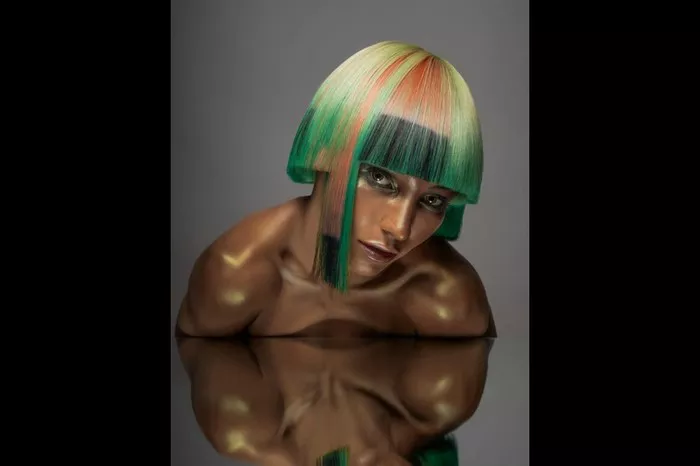ATLANTA (AP) — For Black women around the world, the ritual of getting synthetic braids has long been a cherished tradition, with hours spent in salons, dorm rooms, and living rooms to achieve the perfect hairstyle. But now, questions are being raised about whether the convenience and aesthetic benefits of synthetic braids come at the cost of potential health risks.
The ongoing conversation, fueled by the delayed federal proposal to ban the carcinogen formaldehyde in hair-straightening chemicals, has sparked growing concern within the Black community. Social media discussions have increasingly focused on the health implications of using synthetic hair, especially after a recent study by Consumer Reports highlighted chemicals found in popular braiding products.
Although there is limited research into the risks associated with synthetic braids, experts agree that further investigation is necessary. Here’s a closer look at the knowns, unknowns, and practical advice for those who may be concerned about the products they use.
What’s Known About Synthetic Braids?
Drawing definitive conclusions about synthetic braids is difficult due to the limited research available. The Consumer Reports study, released in February, identified harmful chemicals like lead, benzene, and other carcinogens in ten popular synthetic braiding products. Despite this, the study’s credibility has been questioned by experts, as it did not undergo the rigorous peer-review process typical of scientific or medical journals.
Javon Ford, a cosmetic chemist who shares his expertise on social media, criticized the study’s methodology, pointing out that it only tested two samples of each product, despite the vast number of options available. James Rogers, head of product safety at Consumer Reports, acknowledged the study’s limitations but emphasized the importance of sharing the findings to initiate a conversation, given the lack of comprehensive research on the subject.
A 2020 study published in Environmental Health Insights found that synthetic hair released volatile organic compounds (VOCs)—chemicals that can evaporate into the air—when heated. Similar to the findings in the Consumer Reports study, the research detected carcinogens like benzene. This study raised alarms about the potential dangers of synthetic hair when exposed to heat, commonly used in the braiding process.
What’s Still Unknown About Synthetic Braids?
Despite growing concerns, experts are unable to definitively confirm whether synthetic braids are truly unsafe. The primary obstacle is the lack of comprehensive research. Additionally, there is minimal governmental oversight on synthetic braiding products, leaving manufacturers to self-regulate.
In response, Consumer Reports has petitioned the Food and Drug Administration (FDA) to begin regulating these products. Jasmine McDonald, an epidemiology professor at Columbia University, who has researched the health impacts of chemical hair straighteners, cautioned against letting fear dominate the conversation. Instead, she stressed the need to raise awareness about the potential harms associated with these products, pointing to the lack of regulation and the scant research in this area.
“I think that in our culture, we sometimes normalize things to the point where we don’t see the harm,” McDonald said. “The more we can raise awareness, the more potential we have to prevent any harm.”
Alternative Hair Care Options
For those concerned about using synthetic braids or hair-straightening chemicals, there are alternative options available. Gloria Okpurukre, owner of Anointed Fingers braiding salon in Fayetteville, Georgia, suggests using Brazilian wool hair as an alternative to synthetic products. Additionally, braiding natural hair is an option, though it may not offer the same volume and length as synthetic extensions.
Okpurukre acknowledged that many individuals use synthetic hair to combat hair thinning and add fullness. However, some synthetic brands now offer products made from banana fiber, which manufacturers claim are less irritating to the scalp. Still, experts caution that switching brands may not necessarily eliminate exposure to harmful chemicals.
Molecular biologist Raven Baxter, who has discussed braiding hair on social media, chose to stop using synthetic products due to the lack of research and transparency. Now, she opts for single-ingredient hair care products like aloe vera gel and vegetable glycerin.
“A lot of the work that scientists do is only supported when a funder deems it important,” Baxter explained. “Until we have funders that prioritize our concerns, we may not see the research that addresses them.”
Expert Recommendations
McDonald recommends avoiding products that contain potentially harmful chemicals, such as PFAS (per- and polyfluoroalkyl substances), parabens, and other so-called “forever chemicals.”
Consumers can also turn to online resources like the Breast Cancer Prevention Partners’ Campaign for Safe Cosmetics to assess the safety of hair care products.
As the conversation around synthetic braids and hair-straightening chemicals evolves, experts agree that raising awareness is crucial. Until more research is conducted, consumers should remain cautious and consider alternatives when possible to protect their health.
Related topics:
- I Tried Hair Rollers in 87% Humidity—And My Volume Lasted
- Study Reveals Dangerous Chemicals in Popular Synthetic Hair Brands
- Best Foods for Hair Growth and Strength: What Experts Recommend


